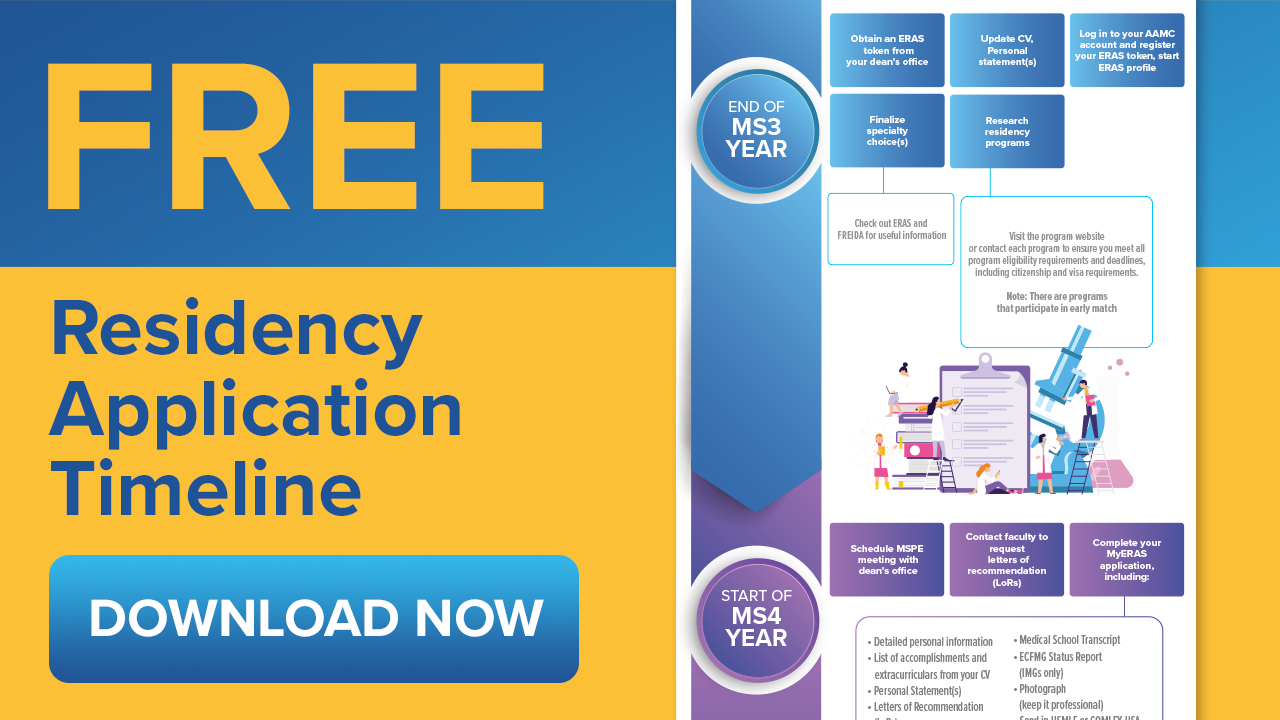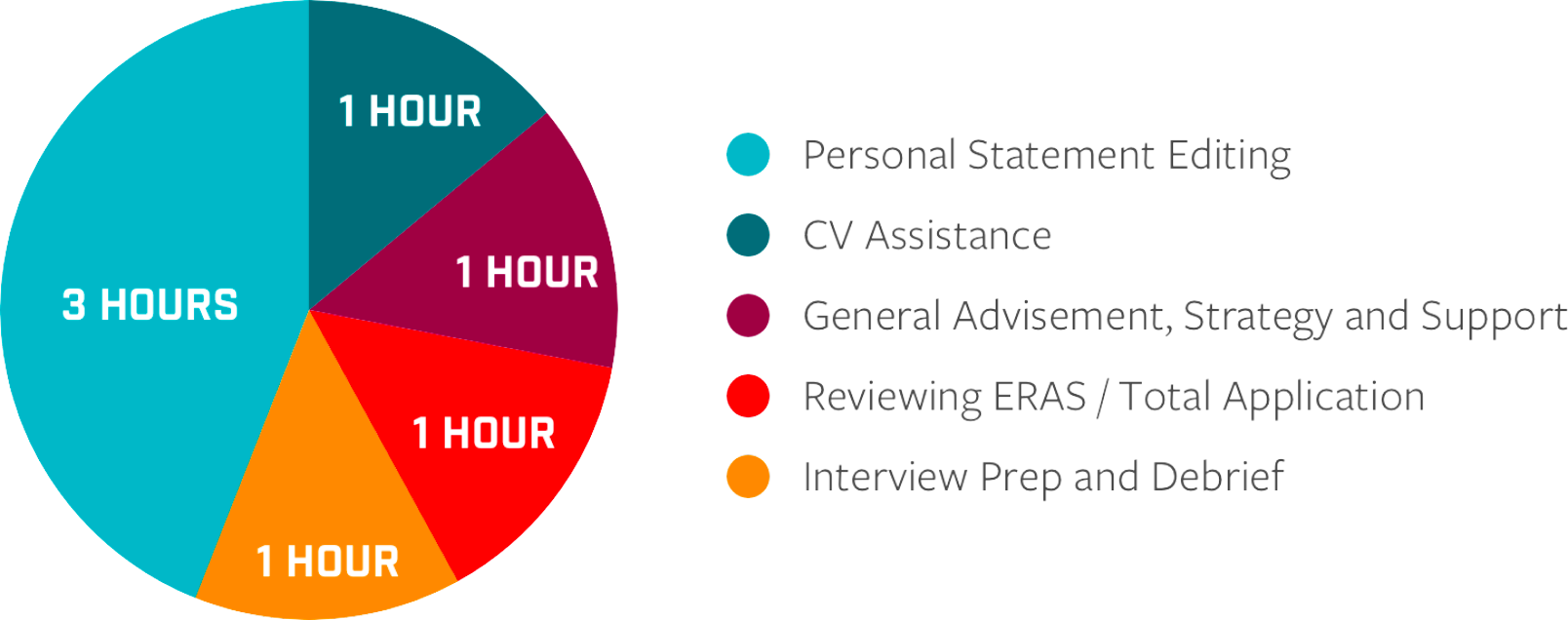

Starting your residency application can feel like an overwhelming task, especially when it comes to writing your ERAS personal statement. It’s not clear why essays of this nature are so intimidating—maybe it’s because not all medical students are well-versed in language arts, many of us dislike writing, or maybe just the thought of putting “who you are” onto paper brings to the surface some uncomfortable feelings of self-awareness (whoa—this just got intense!).
This is a joke or course, but to be honest, sometimes when we sit down to write our ERAS personal statement we immediately think things like, “I’m not that interesting,” or “I haven’t done anything cool in life, I’ve spent most of my time in school thus far.” And that is completely normal. The majority of us haven’t had those pivotal moments in life that shake the ground beneath us and form a new foundation for who we are, and that’s OK!
Your ERAS personal statement isn’t intended to be a best-selling memoir. It’s intended to add another dimension to the otherwise black-and-white application full of scores and grades. It is an opportunity to show program directors your personality, what motivates you, and what you’re looking for in a residency program.
While you’ve probably heard all of this before, we bet you have more specific questions about how to tackle the ERAS personal statement. All of us sure did! So, without further ado, h ere are answers to the 12 most important questions about medical residency personal statements.

Navigating residency applications can feel daunting, with a multitude of aspects to consider and the pressure to do well. If you’re applying to residency soon and aren’t sure where to start, download the FREE Residency Application Timeline to stay on track and make sure your top programs receive your very best residency application!
According to the 2020 NRMP program director survey,
78% of program directors cite the ERAS personal statement as an important factor in deciding which candidates to interview,
making it the fourth-highest ranked factor behind USMLE Step 1, USMLE Step 2, and letters of recommendation. So, it’s pretty important in the grand scheme of your application!
Now, from experience in talking to different program directors and mentors, it’s clear that the most important thing is that your ERAS personal statement is well organized, well written, with proper grammar, no red flags, and that it’s only one page single-spaced. The standard ERAS personal statement length is typically 500-800 words (roughly four paragraphs).
A personal statement typically isn’t the “maker” of your residency application—however, it can be a deal “breaker” if it doesn’t have those attributes. That said, if you have a memorable, well-written personal statement, program directors will mention it, and it will make you stand out as an applicant. If they are on the fence about whether or not to interview you, a personal statement could potentially be the deciding factor. So, it’s pretty important!
A good ERAS personal statement should include the following:
There are different ways to go about doing this, but if you’re stuck, an effective way to grab the reader’s attention is to open with a patient vignette. An interesting case is sure to pique the curiosity of your reader and keep them engaged as they read. Preventing boredom is something to strive for, as your application is one of perhaps hundreds that they are reading.
Ultimately, though, remember this is a personal statement. After you reveal the diagnosis or outcome of the patient vignette, you need to let the reader know what the case meant to you! The point of relating the vignette is to reveal something about yourself, not just present an interesting story about a patient.
When letting the reader know what your positive qualities are, it’s important to remember a basic rule of good writing: SHOW, don’t tell. For example, instead of saying you are compassionate, describe a story from your life that demonstrates your compassion.
This includes jobs, extracurricular activities, and hobbies that would help you to be an ideal candidate for whichever residency you are applying to. Pro tip: DON’T REGURGITATE YOUR CV. This is your opportunity to tell people things that aren’t on your CV. Do you play chess in the park every Saturday, or have you traveled to some amazing places? Tell us about it!
You shouldn’t rehash your CV in your personal statement, but it is a great place to elaborate on activities listed on your CV. It can be used to explain why those activities are so important to you, how they have helped you grow as a person, and other things that don’t often shine through on the CV itself.
The most important part of your statement is providing proof of why you should be accepted. Describe your strengths, but do not talk about things too generally. You should be able to back up everything you say. Give details and examples. Which doctors have you shadowed? What kind of research have you been involved in, and where was it published? Don’t just mention that you have volunteered, say the names of places you were at and what you were doing.
This doesn’t have to be a profound story, but it should be the truth!
Is a strong procedural curriculum important to you? Is the culture of the program more important? Try to mention things you know your programs of choice embody.
Did you do poorly on Step 1? Did you take a leave of absence for a long time? Best to just come out and talk about it without being defensive. Show how you have grown from the experience, rather than apologizing for it!
Sometimes the first and the last sentence of the statement are the hardest to come up with, but it’s worth your time to make it tidy, even if it isn’t profound.
Stay away from extreme religious or political statements. It doesn’t mean you can’t say you are an active member of church, but don’t use this as an opportunity to discuss whether or not you are pro-choice. You never know who is going to be reading this, and anything too polarizing can be off-putting for some readers.
Leave out any traces of bitterness, defensiveness, or anger about anything that has happened in your life. Everything must have a positive spin.
Avoid talking about yourself in a glorifying manner, but don’t go too far the other way and come off as too modest.
You don’t want to go overboard with the qualifiers, which are words such as “really,” “quite,” “very,” etc. In fact, in many cases, it’s better not to use them at all.
It’s a personal statement, not a creative writing assignment. Keep the language in your statement simple. You’re not going to score any points by using unnecessarily fancy words. Your goal is clear communication.
Also, don’t try to sound like a doctor. This is just another way of trying to impress the reader. You want the reader to like you based on the way you write, not be turned off because you are trying to impress them.
“Try to avoid using a lot of jargon and abbreviations,” advises Mary Dundas, educator at Academized.
Avoid talking hyperbolically about how passionate you are. As noted earlier, it’s better to show than tell so give examples of things you have done. Above all, keep the writing in your statement professional.
If you avoid these common mistakes, you’ll be way ahead of most applicants!
As evidenced by The Voice and American Idol , it is everyone’s impulse to divulge their “sob story” to help them stand out and garner sympathy from the audience. While it’s important to include stories that helped shape you as a person, it is very transparent and cliché to talk about that person you know who was struck by a medical tragedy, and how ever since you vowed to “save people.”
The best way to make your statement unique is to allow your personality to shine through.
Use your words, your humor, and your depth to tell your story. Find a way to show yourself to your reader, and if you do this, your essay will be unique!
In short, absolutely have multiple personal statements to upload. Especially if you are applying to more than one specialty, it’s essential that you have several versions of your personal statement.
That doesn’t mean you have to write a whole new one, you just have to tailor it to fit that specialty. If you’re applying for a preliminary year, tailor your personal statement to explain how important you feel a solid foundation in medicine is for dermatology (or whichever specialty you are applying to) and what you’re looking for in a preliminary year.
Furthermore, I found that for the programs I really wanted to interview with, I would upload a tailored personal statement for that program saying something like, “I am seeking a family medicine residency position with ABC University program because of their dedication to XYZ.” Simply name-dropping their institution and noting the strength of their program demonstrates your attention to detail and interest in their institution. Even if you are an amazing applicant, if a program doesn’t feel you are interested in their specific program, they won’t interview you. It’s best to make sure you give those out-of-state programs some extra attention so they know you are willing to relocate for them!
Lastly, you should know that you can upload as many versions of your personal statement as you like onto ERAS, but be especially careful when uploading and make sure you apply the correct personal statement to each program! Triple-check your work! Pro Tip: Use your file names to help you stay organized. Pick a format and stick with it, such as “PS-JohnsHopkins,” “USCF-PS,” etc.
The sooner the better, people. Get cracking now! You can even begin to think of ideas during your third year as you develop your interests in specific specialties. As ideas come to you, jot them into your phone so you don’t forget!
One of the best ways to begin writing your personal statement is to go over some questions about yourself. Ask yourself, who are you and what drives you forward? Think about the kinds of things that interest you and why you developed those interests. Maybe consider some mistakes you have made, how you learned from them, and how they have changed you. Or ask yourself, how do your interests and personality contribute to the goals you have set?
Think about those kinds of questions and write down the answers. Reflect on them, put them away, and come back to them. Then, use them to form an outline—this will help you figure out all your points and what you want to say before you start writing.
If you still feel like you just don’t know how to get started, give the five-point essay format a shot and see if it works for you. In short, you begin with a paragraph that is about four or five sentences long. The goal of this first paragraph is to grab a reader’s attention. Use the next three or four body paragraphs to talk about yourself. Try and have one of them focus on your clinical understanding, while another talks about service. Then end with a solid conclusion paragraph that mirrors your introduction, summarizes who you are, and ends by looking toward the future.
Yes. Yes. A thousand times, YES! Absolutely ask for feedback on your personal statement. After getting your draft finished, show it to whoever will look at it—however, please remember to take everyone’s advice with a grain of salt and to strongly consider the source. It is absolutely essential to have your personal statement reviewed by an objective third party to ensure that the message you are trying to communicate is loud and clear. This means that you shouldn’t give it to a friend or family member who is going to placate you with a useless, “Yeah, looks great!”
Find a mentor, advisor, chief resident or attending, someone who is accustomed to reading ERAS personal statements, and get feedback from them. You can be certain that going through this step will only make your personal statement better. If you take their advice and don’t like how things are panning out, you can always revert back to an older draft.
But in just about every case, another set of eyes to give you big-picture feedback on what you’ve written will improve your piece. Do this early in the process, when you have gotten a simple draft together, so that you don’t present someone with an idea that you are married to, only to find out that it doesn’t come through clearly.
Be sure to ask other people what they think of your draft, but be careful about asking other students for help. Sometimes they get weird, and try to give you advice about making your statement more like theirs because they want to feel justified in their own efforts.
Finally, it should be mentioned that there are services out there that will “write your personal statement” for you. Aside from the obvious reasons why not to do this, you have to be really careful. Those services don’t know you, don’t know your voice, and oftentimes have very generic ways of putting these statements together. Using a service to help polish your statement, though, is A-OK. Some you may find useful in that regard are ViaWriting , Writing Populist , StateofWriting , and SimpleGrad .
Lastly, you may consider working with a residency counselor who can help set your application apart with insider advice and ensure you optimize all elements of the residency application process. Our residency consultants are residents and attendings who have successfully guided hundreds of students from residency applications through the Match!
Typical residency consulting work consists of:

Not sure if a residency consultant is the right fit for you? Take this quiz to see if you would benefit from some extra guidance during the residency application process!
Every good writer learned how to write by reading the works of other people. This includes personal statements! Very often your career offices from your undergraduate studies will have examples of personal statements that can serve as inspiration for your own masterpiece. You can also ask older classmates and recent graduates if they would feel comfortable sharing their personal statements with you.
Remember, too, that inspiration can come from nontraditional sources. Try reading poetry or a novel before sitting down to write your statement. You might be surprised by how it helps to get your creative juices flowing!
It’s better to focus on several key experiences rather than provide a broad overview of your life up to the present time. Your resume will fill in any gaps for your reader. The point of the personal statement is to spend a few paragraphs reflecting on one or two themes that define who you are as a person. Stay focused, and go deep!
Remember, the majority of training programs you will be applying to are academic medical centers. For those programs in particular, make sure to emphasize why an academic environment is a good fit for you. This does not have to mean research! Perhaps you like the idea of becoming a clinician educator and want to be at XYZ program for the opportunity to teach medical students.
Likewise, if you are applying to a program at a community hospital, make sure to reflect on how your career goals are suited for that environment. Maybe private practice is on your radar, or you want to practice in a hospital that is more close-knit than a large academic center.
Whatever the case, try to make your stated career goals align with the orientation of the program you’re applying to. In reality, you may have no idea what direction you want your career to go in. But for a personal statement, try to commit to one general theme if possible.
For applicants who are also applying to preliminary or transitional year programs, it can seem daunting to tailor your personal statement to a position that isn’t part of your ultimate specialty. But don’t worry—preliminary and transitional year programs still want to know who you are as a person and why you’re interested in anesthesiology, dermatology, or whatever advanced specialty you’re aiming for. You don’t need to change your personal statement as much as you may think!
The goal of a personal statement for these one-year programs is not to convince the reader that you suddenly love internal medicine despite going into radiology. The reader knows this is a temporary stopping place for you. Instead, emphasize the traits that make you YOU and will enhance their hospital!
Some of you may be thinking of alternative career paths after residency such as consulting or pharmaceutical work. It’s probably best to leave those specific goals out of your ERAS personal statement and allow readers to assume that you want to continue in clinical medicine after graduating from residency. You might want to instead phrase it as something you want to be incorporated into your clinical career, but not something you would leave medicine for, even if that’s what you have in mind!
Remember, you are under no obligation to share your every thought and desire in a personal statement! These statements are being read by reviewers who dedicated their lives to education and clinical medicine, so keep that in mind.
Keep these tips in mind as you write your ERAS personal statement, and you’ll be way ahead of the other applicants. If you start to get stressed out, remember, you have an amazing story to tell, and we are here to help tease that story out from the confines of your brain! For more help, reach out to one of our residency advisors.
Looking for more help during the residency application process? We’ve got you covered with more (free!) content written by Blueprint tutors: